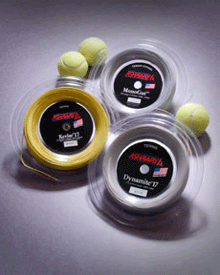|
|
Hybrid Stringing Saves Money and Improves Performance,
Says Ashaway's Steve Crandall
|

According to Ashaway's Steve Crandall, hybrid stringing can not only improve a player's performance, it can also save them money. |
Outlines six different main/cross combinations for a range of playing styles and budgets
Chronic string breakers and young and upcoming tennis players would do well to consider hybrid stringing, says Steve Crandall, a noted stringing expert and Vice President of Ashaway Racket Strings. Hybrid stringing, he says, can not only improve a player's performance, it can also save them money.
Hybrid stringing involves using one type of string for the racquet mains and another type for the crosses, Crandall explained. The process originated as a way of optimizing the performance of oversized racquets when they were first introduced. "Hybrid stringing has since become very popular among top players as a way to tailor racquet performance to their individual style of play," said Crandall. "But younger players on tight budgets, as well as chronic string breakers, can use the technique to save money on string."
The trick, he said, is to buy string in bulk reels instead of individual sets. Crandall outlined a number of main/cross string combinations players can use to economize and/or improve racquet performance. "The Cadillac of hybrids would be a combination of Kevlar® string for the mains and a high-end Zyex® string, like Ashaway's Dynamite®, for the crosses. This gives you a very durable string bed, exceptional power and consistency - especially in hot weather - and gut-like playability, but it is perhaps not the most economical of choices."
Other options would include marrying Kevlar or other aramid mains with synthetic gut crosses, or even with a basic nylon monofilament string like Ashaway's Liberty®. "These combinations allow you to retain a high degree of durability while either tailoring the resiliency of the string bed and/or simply reducing string costs," said Crandall. "One reel of Liberty can make about 40 sets of crosses for about $0.50 each."
For more "Chevy-minded" players, Crandall advises using a monogut string for the mains and again, either a high-end Zyex, mid-range synthetic gut, or economy-brand nylon monofilament for the crosses. "Many younger players do not have breakage issues," Crandall said, "but do operate on tight budgets, as do many high school, college and other teams. This hybrid strategy provides players and coaches with the best of both worlds. They can optimize performance and restring for the lowest possible cost."
Ashaway Racket Strings are made by Ashaway Line & Twine Mfg. Co., the only U.S. manufacturer of string for squash, tennis, racquetball, and badminton. Operated by the Crandall family since 1824, Ashaway has been making racket strings since 1949, and is responsible for several important technical innovations. Ashaway is the Official String of USA Racquetball, the International Racquetball Tour, the Professional Squash Association and the Women's International Squash Players Association. Ashaway Line & Twine Mfg. Co. also makes braided products for medical and industrial applications.
|